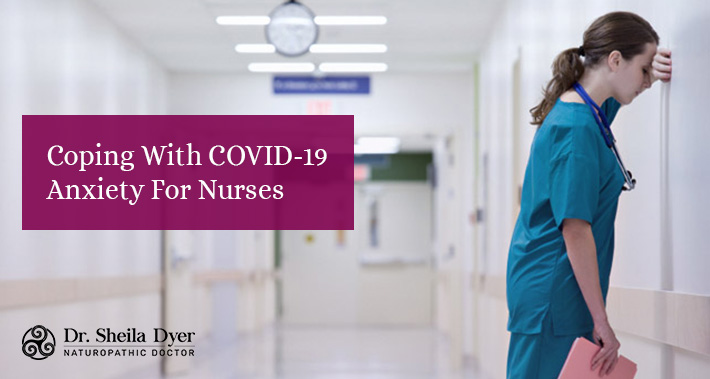The world is going through a stressful time right now.
And while the advice to most people is to self-isolate and stay home, this isn’t possible for everyone.
Nurse and other health-care workers are not only at the front-lines of this crisis, they are risking contact with COVID-19 patients every day.
As a naturopathic doctor in Toronto, as well as being a registered nurse, I want to share some strategies for coping with anxiety for nurses, and other health-care workers.
Read on for some helpful tips.
What We Know From Previous Pandemics
Looking at the past can help us to create a framework for how we view current events.
The Canadian Journal of Psychiatry looked at the impact the SARS Epidemic of the early 2000s had on hospital employees.
It found that approximately 10% of survey respondents experienced post-traumatic stress symptoms following the SARS outbreak.
Additionally, the study showed those who believed they were performing an altruistic act by helping others were less prone to negative impacts.
Another study, published in 2019 looked at the resilience and emotional impacts of health care workers involved in the response to Ebola in Africa.
Participating healthcare workers were trained in methods designed to develop personal resilience, and were encouraged to complete daily self-assessments to look for risk factors of traumatic stress.
These reports allowed behavioural health responders to recognize when there was a need to step in and provide psychological first aid for frontline workers.
This study showed the viability of such a project to protect the mental health of health care workers.
What Is Post-Traumatic Stress Disorder?
Post-traumatic stress disorder (PTSD) occurs after a person has been exposed to a traumatic event.
Individuals with PTSD have a heightened fight, flight, or freeze response, and often feel stressed or fearful even when in an otherwise safe environment.
Symptoms Of PTSD
Symptoms of PTSD include:
- Flashbacks
- Unpleasant, vivid memories
- Nightmares
- Physical or mental distress when thinking about the event
- Avoidance of situations which trigger thoughts of the event
- Difficulty concentrating
- Anger and irritability
- Feelings of blame or guilt
- Memory issues
- Less interest in activities you once enjoyed
Burnout
Another condition which many people who feel stressed out may deal with is burnout.
Although not classified as a medical diagnosis like PTSD, burnout is also linked to symptoms which can occur when you are under high amounts of stress.
Burnout can put you at risk of adrenal fatigue when your body’s coping mechanisms for dealing with stress start to break down.
What Is Compassion Fatigue?
Compassion fatigue, or secondary traumatic response, is common among first responders and results from the stress of caring for trauma victims.
The constant exposure to the traumatic experiences of others, along with the fact that many people in these situations will attempt to empathize with those they are caring for can lead to compassion fatigue and an increased risk of burnout.
Natural Solutions For Mental Health Concerns
If you are a nurse or other frontline worker there are things you can do to protect yourself against the risk of PTSD, burnout, and compassion fatigue.
1. Seek Professional Help
As the COVID-19 pandemic progresses, organizations such as the Centre for Addiction and Mental Health (CAMH) are recognizing the needs for mental health supports for health care workers impacted by these events.
You can self-refer to psychotherapy and psychiatric services at CAMH if you:
- Work in health care, in Ontario
- Are impacted by COVID-19 related stress, and
- Require mental health or addictions support
2. Consider Adaptogenic Herbs
Botanical medicine has a long history of being used to help manage anxiety.
Some common adaptogens, and what they can help with include:
- American ginseng: boosts memory and increase reaction time
- Ashwagandha: relieves stress
- Goji berry: increases energy
- Licorice root: reduces stress
- Holy basil: Lowers stress and anxiety related to stress
- Turmeric: Increases brain function, decreases depression
3. Practice Mindfulness
Mindfulness means taking the time to slow down, and pay attention to the present moment.
In a world of being constantly on-the-go, and the ever-present temptation of our smartphones in our pockets, mindfulness can be quite difficult for a lot of people.
Learning to practice mindfulness has a wide range of benefits including:
- Improved cardiovascular health
- Lower stress
- Improved immune system health
- Better sleep
- Increased mental sharpness and slowed age-related cognitive decline
4. Do Your Best To Maintain Good Sleep & Diet Habits
Although maintaining good sleep and healthy eating habits sounds obvious, they’re often the first things to be left behind when things start to get stressful.
Stress can lead to having difficulty falling and staying asleep.
Working long shifts may lead you to be more likely to pick up fast-food, or skip meals altogether.
However, during times of high stress, it’s more important than ever to maintain healthy habits in order to stay healthy.
5. Above All, Be Kind To Yourself
Self-compassion is important for all of us to practice.
Take the time to put your thoughts into perspective, and allow yourself to feel emotions – even negative ones – without judgement is important.
Recognizing that some days will be easier than others, and looking for things you can control when things around you start to get out of control can help you to put things in perspective
Book An Appointment With Dr. Sheila Dyer, ND
Are you struggling with anxiety due to the COVID-19 pandemic?
Has your job as a front-line healthcare worker suddenly become even more stressful, as you worry about contracting or spreading the virus?
I’m Dr. Sheila and I’m here to help.
Even though there is currently no known cure or treatment for COVID-19 itself, I can help you to manage your anxiety and offer natural solutions to help get you through these difficult times.
If you want to learn more about the ways naturopathic medicine can be used to help get your stress under control, contact me to book a consultation today.
If you have questions about naturopathic medicine, or would like to start with your first consultation, contact me, and let’s book an appointment.
Dr. Sheila Dyer, ND1080 Dovercourt Rd,
Toronto, ON M6H 2X8
(416) 554-5135
► https://g.page/DrSheilaDyerNd
Dr. Sheila Dyer is a Naturopathic Doctor and a practicing registered nurse offering holistic healthcare with a scientific focus

